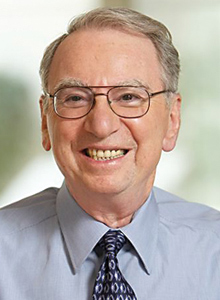-
(b.) - ?1933 October 18
Bio/Description
An Electrical Engineer, a co-founder and former Chairman of Qualcomm Incorporated, an American global semiconductor company in San Diego, CA that designs, manufactures and markets digital wireless telecommunications products and services. He is also Chairman of the Board of Trustees of the Salk Institute, an independent, non-profit, scientific research institute located in La Jolla, California. He was born into a Jewish family in New Bedford, Massachusetts in 1933. He earned his B.S. degree in Electrical Engineering from Cornell University in 1956, and his S.M. and Sc.D. degrees in EECS (Electrical Engineering and Computer Science) from the Massachusetts Institute of Technology (MIT) in 1957 and 1959, respectively. His doctoral advisor was Edward Arthurs. Additionally, he is a brother of Sigma Alpha Mu Fraternity. He was Assistant and Associate Professor of Electrical Engineering at MIT from 1959 to 1966 and Professor of Computer Science and Engineering at University of California, San Diego from 1966 to 1972. He co-authored a textbook entitled, ?Principles of Communication Engineering? in 1965, which is still in use today. UCSD's Jacobs School of Engineering is named for him and his wife. In 1968 he co-founded Linkabit Corporation with Andrew Viterbi to develop satellite encryption devices. That company merged with M/A-COM in 1980, becoming M/A-COM Linkabit. In 1985 he went on to co-found Qualcomm Incorporated. QUALCOMM's OmniTRACS system is one of the world's most "technologically advanced two-way mobile satellite communications and tracking systems. He pioneered these systems which use the communication bandwidth more efficiently than the older fixed time-sliced TDMA technology. Its Code Division Multiple Access (CDMA) has been adopted as one of two digital standards for the next generation of cellular telephones in North America. He announced on March 3, 2009 that he had stepped down as Chairman of Qualcomm and that Paul E. Jacobs, his son, had been named to succeed him. He is a member of the National Academy of Engineering and a Fellow of the IEEE. He is a chairman on the Salk Institute for Biological Studies, and is on the International Advisory Board for the Israel Institute of Technology. Additionally, he serves on the Advisory Board for the School of Economics and Management at Tsing Hua University in Beijing. He is also active on the board of directors of the Pacific Council on International Policy in Los Angeles. In 1980, he was the co-recipient, with Andrew J. Viterbi, the 1980 American Institute of Aeronautics and Astronautics (AIAA) biannual award. In 1992, he was awarded the Entrepreneur of the Year Award in High Technology by the Institute of American Entrepreneurs; and in May 1993, he was awarded the American Electronics Association (AEA) "Inventing America's Future" award. For his development of CDMA, he was awarded the National Medal of Technology and Innovation in 1994. That same year, he was awarded the 1994 Cornell University Entrepreneur of the Year Award. In 1995, he won the 1995 IEEE Alexander Graham Bell Medal For outstanding contributions to telecommunications, including leadership, theory, practice and product development. He was named a Marconi Prize recipient and Marconi Fellow in 2011, and was awarded the Bower Award for Business Leadership in 2001. He and his wife Joan Jacobs are contributors to public arts and education in San Diego. For this, he was awarded the Woodrow Wilson Award for Corporate Citizenship in 2004. He delivered the 2005 commencement speech at MIT, and the 2008 commencement speech at the Jacobs School of Engineering. He and Andrew J. Viterbi received the 2007 IEEE/RSE Wolfson James Clerk Maxwell Award, for "fundamental contributions, innovation, and leadership that enabled the growth of wireless telecommunications". On April 19, 2012, he was named the W. P. Carey School Dean?s Council of 100 Executive of the Year ? an honor reserved for change-making business leaders who serve as models for today?s business students. Recent honorees include Richard Adkerson, president and CEO of Freeport-McMoran Copper & Gold, Inc. and Alan Mullaly, president and CEO, Ford Motor Company. As the co-founder and Chairman of Qualcomm, he has contributed hundreds of millions of dollars to the field of education through generous donations and grants to several schools and organizations. His donations have gone mostly towards fellowships and scholarships for deserving students in the fields of Engineering and Computer Science, as well as the arts, and are focused in the San Diego area. The San Diego Union Tribune in 2011 dubbed him the "Philanthropist in Chief". He and his wife Joan have been cited by Business Week and Chronicle of Philanthropy among the 50 Most-Generous Philanthropists in the United States. They have donated several million dollars to various causes including: the Massachusetts Institute of Technology; the University of California at San Diego; the American Society for Technion, his alma mater Cornell University, KPBS Radio and Television, and San Diego Natural History Museum. the Jacobs School of Engineering at the University of California San Diego. He and his wife have made major donations to the University of California, San Diego for a future specialty hospital as well as several million to replace the central library in downtown San Diego. Also in 2005 the Joan and Irwin Jacobs Center for La Jolla Playhouse was named after him and his wife in honor of their philanthropic contributions towards the institution's development.
-
Date of Birth:
1933 October 18 -
Gender:
Male -
Noted For:
Pioneer of the OmniTRACS system, one of the world's most "technologically advanced two-way mobile satellite communications and tracking systems -
Category of Achievement:
-
More Info:


